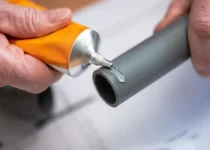Will Super Glue Work on Plastic
Super glue or cyanoacrylate is an excellent choice for repairs that are done regularly. It can also dry quickly. Super glues designed for polyethene and polypropylene may also contain primers to prepare the plastic. short answer to your question is yes super glue can work on plastic items to bond them together with plastic and other types of materials available in market like fabrics, metals, wood etc.
What is Super Glue?
Super Glue is a type of adhesive that’s also called cyanoacrylate. The glues react with moisture in the air or on the surface of the bond materials. Many types of glue meet this definition, but as we will discuss later, there are important differences. However, they share some characteristics that can be best explained by examining their strengths and weaknesses.

What are the advantages of super glue?
-
Fast bonding
Super glues are characterized by their speed of bonding. This can usually be measured in seconds. You can expect different grades and even performance differences depending on your environment and the materials you are using. The bonding process is generally faster when the environment is warmer and more humid.
-
High strength Bonds
Super glues are also known for the strength of their bonds. This is a general statement, and there may be variations depending on the grade of glue, the materials used, and other factors.
-
Material compatibility
Super glues can be used with a wide variety of materials. The majority will bond metals such as copper, brass, aluminum, zinc, wood, ceramics and glass. This is one of many differences between grades. It’s also one of the most important things to consider when selecting glue.
-
Economy
Super Glues can be used very economically. They may seem expensive compared to generic adhesives, but the value of each tube is what matters. One drop of superglue will cover an area of about 25mm2. One of the biggest mistakes with superglue is using too much. It can slow down the curing process and, in some cases, reduce bond strength. Super glues are often more effective than other adhesives. A single pen can bond several items.
-
Simplicity: No mixing
Super Glues come in a single part, so there is no need to mix. It can be an advantage, as other glues need precise mixtures of parts to work. Suppose you use a filler, primer or activator. In that case, you will only need to mix anything with super glue when you are mixing precise weights and volumes.

A Fan-Favorite Super Glue For Most Plastics
Super glue, or cyanoacrylate, known in the industry, is a high-strength instant adhesive that can bond virtually any material. Super glues have a high resistance to moisture and temperature. They are used for stone, metal, ceramic, paper, and plastic.
Super glue is usually available in gel or liquid form. Liquids penetrate cracks or fractures better and dry more quickly than gels. Gels are more flexible than liquids, and their viscosity is higher, so they will not drip. This makes them a better choice for projects that require greater precision or vertical application.
The strength of super glue and its speedy application make it an excellent choice. Super glue for plastics is ideal for repairs on Plexiglass (or polycarbonate), polystyrene and polyvinyl chloride (PVC). This two-part glue sets up quickly and without clamping, providing tremendous strength in just one drop.
Super glue is the best choice for clear, quick-drying glue. The glue begins to dry in 10 to 45 seconds. This means you don’t have to hold the plastic pieces together for hours. The tensile strength of the glue varies from 500 to 1,500 PSI depending on the materials you are gluing.
Super glue can attach plastic, but the resultant connection is not very strong or durable. Super glue is impermeable and does not allow moisture to pass through. When there is a wet substance, the glue will spread. This is because superglue is impenetrable. Construction glues and similar adhesives rely heavily on evaporation to adhere to materials.
The glue will contract, so the surfaces must be secured to each other. Super glues are also based on evaporation, but they have some key differences. Superglues do not shrink, which is one reason they are so strong. Instructions for superglue often emphasize that you should use less than the recommended amount.
The formula is thick and easy to use. The glue is not water-resistant, but it can be applied to various surfaces, including vertical surfaces like walls.
How can you make a super glue stick to plastic?
First, you must create a layer of glue on the plastic to give it something to grab onto. If you don’t do this, the adhesive will not have something to grip onto. In addition to super glue, you’ll need sandpaper and ethyl ethanol. You can also use liquid soap mixed with water or a dampened towel.
Allow the plastics, after removing any glossiness with water and soap or alcohol, to dry completely. Use sandpaper in the 150-200 grit range to create a rough surface allowing the adhesive to stick. Paint Brushes are used to apply the super glue. Fit the pieces together with some force.
The excessive air bubbles must be targeted, so the sides should be pushed with the same force throughout. Hold the parts with clamps, elastic bands or grips for at least one day. The faces will bond quickly and feel solid after the bonding.
Can super glue bond metal to plastic?
It is possible to use super glue to bond metal to plastic. However, the two materials may have difficulty adhering to each other. It is difficult to link these materials together because neither has pores. Before you glue anything, you should roughen up both faces, preferably with steel wool.
You can use any material that works, but steel wool is usually the best for metal. You only need to roughen the surface, not sand it down.
Super glues can produce strong bonds to hold objects together that won’t be under a lot of pressure. These glues are unsuitable for applications that will pressure the bonding. Attaching figures is one example of this type of application.
Frequently Asked Questions
Can Elmer’s glue be used on plastic?
Elmer glue cannot be used to glue plastic. Elmer glue was not designed to be used for gluing plastics. Although it is possible to use Elmer’s glue on some plastics, the bond won’t be strong. Elmer’s glue should not be used on any type of plastic.
What is the best glue for plastic piano keys?
Use soft glue to repair plastic piano keys. Use as little adhesive as possible when applying it to broken keys. You don’t need to glue or jam the keys.
What is the best glue for a plastic refrigerator handle?
Use solvent glue to repair a broken refrigerator handle. Depending on how the handle broke, you may need to prepare the surface.
What is the best glue to fix plastic toys?
Super glues are designed to be used on plastic. Epoxy adhesives can also be used to fix plastic toys. Both types of adhesives are excellent at bonding plastic. Adhesives have a higher strength than super glue. Superglues are more expensive, but they dry faster and cure quicker.

Being associated with art and craft field since decades as a hobbyist and life long learner has given me an opportunity to learn many new things related to art, craft, paints and pottery which i am trying to share with your guys on this website. I have expertise of being professional painter and potter for the last 20+ years
I have learned mind blowing cool tips and insights which makes me a person with ability to improvise and come up with creative ideas and solutions to make stunning and impeccable art pieces of all types which are adored by people across the globe on this website and other platform.


